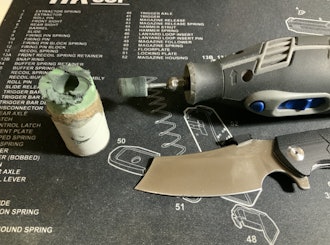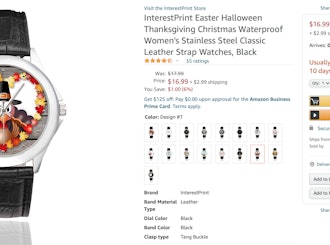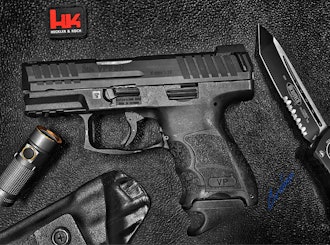Click to view our Accessibility Statement or contact us with accessibility-related questions












Showing 1 of 213 conversations about:

reswright
3850
May 27, 2019
bookmark_border
Cl1ffIt's a learning process. It's hard for Westerners to find out about Chinese businesses. I myself know only the barest minimum.
Chinese businesses really aren't that different from the way many savvy Westerners operate, with holding companies and trading companies and layers and shells within shells that make it hard for anyone from a potential competitor to a tax regulator to examine the normal details of business from afar. Anyone who studies the life of John Rockefeller will see a fairly good model of a Chinese business magnate in that respect. But in some ways they're really really different.
A lot of the time the OEM can't say anything at all about the fact that they made a knife because of nondisclosure agreements they signed as part of the contract, right? But beyond that, the Chinese veil the details of their business operations from people like us who want to know what factory, what people, what process made a knife. It's part business savvy and part culture. The owner doesn't see why we need to know the details of their business. To him it's like 'you didn't get that knife from the factory or the people or the process, you got it from me'. He is the ultimate guarantor of the deal, not the layers of company he operates. And if you have a problem you come to him and he solves it his way, so, he figures, why do you want to know anything about it? If you're trying to figure it out, you might be trying to take it away. You might be trying to reverse engineer their operation. You might be a risk. So people after a while get used to it and adopt a more harmonious approach when they talk with Chinese businessmen, and they don't bring stuff like that up to complicate the discussion.
It might seem silly, but the thing is, it works and you do want to do the deal with that guy. You don't want to look around for a better deal on his street -- you've got no protection if something goes wrong, and things usually do go wrong if you're trying to snag a fast deal on the Chinese street. There's rules but they're kinda big on never giving a sucker an even break, and you, my friend, are clearly from out of town :). The relationship you have with the big man is what protects you. In the West, if you know the supplier, you can try to work with them and the chances are good it'll work. In China, if you try to do an end around to the factory, you'll probably find a way very easily! But it's a trap. Because Chinese businesses had no meaningful trademarks to protect in terms of international trade, for a long time, they took a very pragmatic view to selling items that most US companies would scrap as bad production. In a US company if your parts aren't up to snuff they usually get scrapped or reworked, not sold - otherwise customers would complain about your brand. In China, with no trademarks to protect it's different. Have some items that aren't going to pass the QC of your client? Sell 'em out the back door under the table, do a deal with someone for the lot. This does happen some in the States with organized crime but it's more common in China. So good luck buying knives from the back door, so to speak. You will need it.
Something else along these lines that's less familiar and a lot more disturbing to the Western analyst is the phenomenon known as the 'ghost shift' in many Chinese factories doing OEM work. Those factories are scheduled to work one shift and often two in order to fulfill their contracted obligations to work. To bring in a third shift they need another set of managers and foremen and additional costs and so on on their payroll, because the ones for the first two shifts need to sleep and such. So Western firms try to avoid paying for three shifts unless they're getting a real deal - they're trying to construct the cheapest deal possible, after all, and a shift is only as good as its foremen and managers make it be. Long story short is in some factories that only work one or two shifts, the workers unofficially come back in the evening and work illegally under the table on an unofficial third shift, not to make branded knives for the client like they do during the day, but to make the client's same branded knives for a third party. Many times less expensive materials are used, many times quality standards aren't followed at all, and the production never is reported to the client. Sometimes the owner is doing the deal. Sometimes the owner isn't even aware, a foreman has a deal with a guy he knows. So if you suddenly have a line on a cheaper deal for knifes coming from that factory.... this might be why. And they might not be what you think you're buying. But they will have legitimate OEM branding and trademarks on them. Is it a counterfeit? Is it a clone? It came from the same factory.
It's not all stuff like that tho that makes things different. Another thing that happens more in China than it does elsewhere is rebranding, which is less sinister and more perplexing to the non-Chinese observer. Once, say, KAI contracts and pays for a hundred thousand knives from SRM to be built and branded as the Kershaw Reverb, KAI is generally not interested in another company buying the Reverb and rebranding it with their own logo - not at all. In China, it's completely different: if your competitor comes to you and says 'Sweet knife, I'll take a hundred thousand of 'em and put my name on them instead' instead of calling your lawyer you go 'Sure, let's sit down and work out a deal'. And you do. Depending on the deal and the relationship, the knives that guy gets might be identical, or they might not be. You might go 'Eh, I don't have enough titanium for an extra run but I can do ya some with stainless steel handles' and that's how it goes. But the bottom line is that you can see what LOOKS like the exact same knife elsewhere, just with a different brand logo, for a bargain, and for one or more of these reasons, you get something different from the original. It's annoying when it's one knife; it's a disaster when it's a shipping container full of them.
Some companies aren’t interested in marketing and branding the things they make. So they offer their products for wholesale for anyone to buy - they’ll even make up a brand name for you if you can’t or don’t want to. So you’ll see a dozen branded versions of the same knife. Are they all the same? You don’t know. Did one brand get the better made ones? Was another brand’s deal so cheap that they got a bunch of rejected parts in with their order? Is one of those “brands” gonna be made with cheaper metal? Not heat treated? You don’t know any of it. Good luck finding out.
So it's hard to trace ownership of a product. You can try to go at it from the Western angle - trace a trademark, or look at invoices, or even use tools designed to help businesses find other businesses, but it won't take you far. Google searching in English is extraordinarily non-helpful in this task because the original records aren't in English and there are many ways a Chinese word can be transliterated into English, and hence many different alternate spellings that won't seem intuitive to Westerners (We get it when someone substitutes 'c' for 'k'. There are different rules, from Wade Giles to Big 5, for how you translate Chinese, and the folks filling out forms use the ones they like. When a Chinese word can be transliterated so that it begins with j, g, q, k or even y, we get confused fast. Sometimes that's the point. )
When you combine all this with the fact that many state-run companies begin with the name of city and province (and hence many of the 1500 Chinese knife firms hailing from Yangjiang have names beginning with some variation of 'Yangjiang Guangdong') it can all seem like a lot to wade through, and would be even if they were trying to be straightforward and transparent. Which, as I've said, they usually aren't.
It's why I fall back on looking at manufacturing marks and things like that -- those don't change based on translation and aren't as easy to hide as an OEM's name.
(Edited)
BigBuckNutz
82
May 29, 2019
bookmark_border
reswrightThese are some insightful posts, and I appreciate the thoroughness. It would be nice if there was some resource that could help us all understand better. Obviously for a lot of us, “Made in China” has meant cheaply made mass produced goods for years. Trying to discern what still fits that description can be tough, especially since there is some real high quality stuff coming out. Everyone who populates these boards knows about WE, Kizer, Reate, etc., knowing where value can be had with up-and-comers would be very helpful.

reswright
3850
May 29, 2019
bookmark_border
BigBuckNutzThanks.
There’s no such resource I’m aware of. But I can offer suggestions.
Obviously I’m a personal fan of San Ren Mu. It’s hard to find a sweeter spot in the market in my own opinion in terms of price and performance, at least right now. They also do SRM and Real Steel, and. It’s possible that Kubey is also one of their brands although most Kubeys are a bit pricier and they work with S35VN and titanium, so it’s possible Kubey just buys and rebrands some SRM knives. The same is true of Ruike - ostensibly they’re made by a flashlight company but the knives REALLY look like SRM’s work. Left most bottom knife in the pic is a SRM Land 912. To the right of it, a Ruike P-801. The two fixed knives are a Real Steel Black Cat and a Kubey KU166.
The Firebird line of knives put out by Ganzo tools is generally held to be a strong value. Ganzo got on Western radars by taking a bunch of $200ish old Benchmade and Spyderco and Zero Tolerance and Lionsteel designs, changing the size, maybe changing a design element, then making really good versions with 440C and even D2 for $15-30 a crack. They also market their own designs now. They’re never super original but they’re solid knives and people love them. Ganzo makes some damned good knives for the price. Built to last. I own many. The carbon fiber flipper in the bottom middle is a Firebird FH-41.
One line that does all original designs is TwoSun. Some of the early models are pretty heavy and some of them have annoying clips, but they work with a lot of designers so there’s lots of variation. There was a while that you could reliably get a really good TwoSun in D2 and G10 for under $30. Now people are catching on and the prices are going up. Fast. But you can still get a titanium and M390 TwoSun for under $90 pretty easily. They sell directly on eBay but copies can be found on Amazon at a markup. There’s a thread in Blades on TwoSuns if you want to know more. Rightmost knife on the bottom is a TwoSun Knight.
The last one off the top of my head is Y-Start. Y-Start is a knife counterfeiter (by this I mean fake logos, not just stolen designs) that has recently started to release its own legit designs under its own branding. There’s still a ton of counterfeit Y-Start knives on dhgate. Dunno if those are good or bad, I won’t buy one to find out. Someone else can do that. But I can speak for the LK- and Jin- series they released under their own name as being serious knives for the price, which falls into that $15-30 range. The knife in the pic with the greenish handle is the Y-Start LK5016. I love it. Great feel in the hand. Light, solid.
Good hunting :)
BigBuckNutz
82
May 29, 2019
bookmark_border
reswrightThanks again for the comprehensive and informative post. I saw a couple of SRM drops on here, and was interested, but could not determine if they were “good” or “bad” Chinese (for lack of a more artful description). I’ll certainly check one out now. Who knows, maybe they start making some knifes with exotic blade steels, and in a year or two everyone will be effusively praising San Ren Mu like they do with WE now.

reswright
3850
May 31, 2019
bookmark_border
BigBuckNutz
That would seem a fairly reasonable possibility.
I've been thinking more about the whole 'resource' thing. The problem is that every source of data I know of is self interested to some degree.
There's individual manufacturer websites but manufacturers always say their stuff is the best. There's places like Knife Informer that are usually good but still limited and a bit slanted toward the individual preferences and intentions of the people putting them out. They also tend to be protective of their industry contacts.
This is probably why a lot of other people might suggest a blogger (apparently these days we call them influencers). Maybe the one with the most currency in the US knife community today is a Youtuber going by Luvthemknives - people often shorten his handle to LTK. LTK reviews a fair number of Chinese knives in his videos. I've watched a couple of his reviews and they're pretty sensible and fair, he rates them for what they're worth. Seems to know his business. Dude's hands are one big knife scar; I hear tell we learn best from our mistakes. And I usually agree with points he makes in those reviews of his i've sat down and watched -- they're kinda long but he does cover good points eventually. So if I were going to suggest an influencer as an authority, it might be LTK.
The reason I wouldn't is that influencers, even good ones, aren't neutral and disinterested parties. They can't be, by definition, no matter how moral they are as human beings. They get sent knives for free or at a steep discount by a marketer hoping for a good review, and while they always have the option to be negative about a knife, a good review will probably get them another free knife to review pretty soon and hence more timely content on their blog to enhance their status as a knife authority, whereas a negative review might mean that marketer or company never sends them another knife at all.
For instance: if the first knife you get shipped by Company X is busted and you need to deal with the hassle of customer service and send it back and wait who knows how long to get a refund or a replacement, most consumers would consider that to be important knowledge to know when considering whether to buy a knife from Company X, right? But a blogger might not even let you know it happened to them, because they have to manage their relationships and account for how they get their free knives as part of their decisionmaking. Their review might wholly focus on the second copy of the knife that was sent to them. That's the one thing I'd keep in mind with knife bloggers - they are extremely reluctant to kill the goose that lays their golden eggs. (That and the fact that they can be counted on, reliably, to make you sit through 15 minutes of them chattering away in order to harvest like one minute ten seconds worth of valuable data.)
Still, you might look up a couple LTK reviews on chinese knife brands and see if you find them useful and informative, just in terms of gathering more data about which knives to look for. He reviews all the major brands I'm aware of. Dude must have one hell of a collection.
Related Posts
BillA2021
Buy replacement quartz movement
Is an original quartz movement or a suitable substitution available for my Wenger 7900X watch at a reasonable cost, or is this not feasible I’m new at this. Thanks.
Mar 18, 2021

reswright
Basic Flip Smoothing
So you picked up a budget bearing knife as a ‘project’ knife to putter around with and you’re looking for ideas? One thing you can do is polish the bearing works, smoothing both the flip and the close action until you've got some semblance of a noiseless flick open and a smooth, gravity drop shut. This can be done many, many different ways, as many ways as there are to smooth and then polish metal; your humble narrator prefers to use a Dremel, using the following steps. I should probably make some kind of disclaimer statement here - this guide is for people already handy with a Dremel. If you’re not already handy with one it’s best not to learn how to use one while handling pocket knives or other sharp and pointy things. Hand held high RPM rotary grinding tools can be surprisingly violent if they get out of your firm grasp, they can impart an astonishing amount of kinetic energy to small sharp things you're trying to polish, sending them flying further and faster than...
Feb 6, 2021
RayF
RayF's Guide to Thanksgiving Day Watches
Please do enjoy your Thanksgiving (for those of you in countries where that means something), but please, please, please--whatever you do--don't wear either of these tacky watches while you're doing it!
Nov 26, 2020
Trending Posts in More Community Picks

Graham88
Completely surprised by the lack of blade diversity here on Drop...
I’ve been a collector of Blades since before my teens, and a retailer coming up on 15… or maybe 20 years. Drop has really been kind of an interesting experience for me, because I do occasionally get to see some unusual tech and sometimes EDC items that otherwise I might not have been aware of. And maybe it’s because I have a deep love of cutlery and bladed weapons, but I find myself trolling through the site looking at it what’s available; and it’s just it’s pretty much the same. And the bladed community here is just always confused me.. every single knife is about the same, they’re almost all drop points and although the handle materials change and brands change.. it’s really just the same knife over and over and over again... occasionally you’ll see a tanto or a slight variant; but rarely… and almost never a serrated blade. And I’m just deeply amazed at this diversion of serrated blades. And I’m just surprised there isn’t more of a request for diversity here.... and I...
Mar 12, 2020
JellyDPhoto
Can we get Sony E-Mount or other mirrorless camera options please..
Would be nice to see some Sony E mount full frame cameras on here. I currently shoot with a A99 and they killed the lense path for better or more option lenses and now is all E-Mount. 🤔
Jan 13, 2020
RayF
There Are Pandas, and Then There Are Pandas.
And this isn't either of them! The Pandas we're talking about here, are watches, not bears. And what got me thinking about them (again) was a link posted this morning by @cm.rook who pointed a few of us to the very attractive (and not terribly priced) Yema "Rallygraph" Panda which, in it's most traditional arrangement, looks like the one on the left, but can also be had in the version on the right: The model on the left is a true Panda, while the model on the right is called a reverse Panda. The reason for that distinction is clear--Panda bears, only come in the first arrangement. Now at this point, everyone should be thinking about the most well-know Panda, The Rolex Panda, which is actually a Daytona, and among Rolex Daytonas, the most famous of which is the Paul Newman Daytona, which was famous first, because it was Paul's, and second because it sold at auction for $17.8 million (US Dollars). The story of that auction is well-known so I'll only...
Nov 8, 2019






